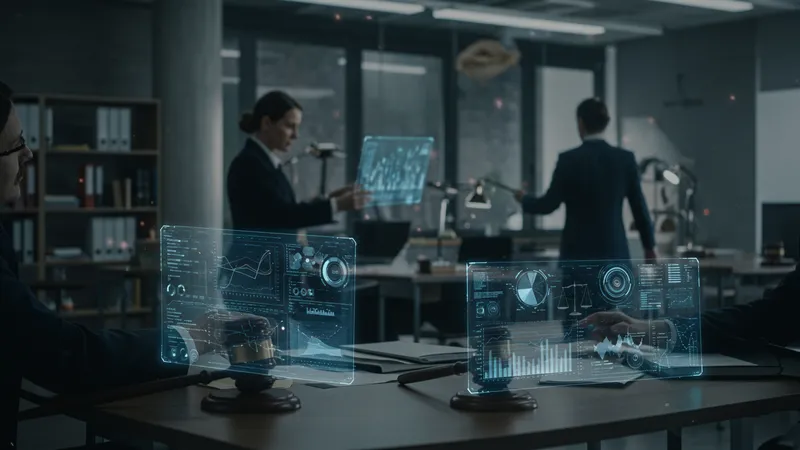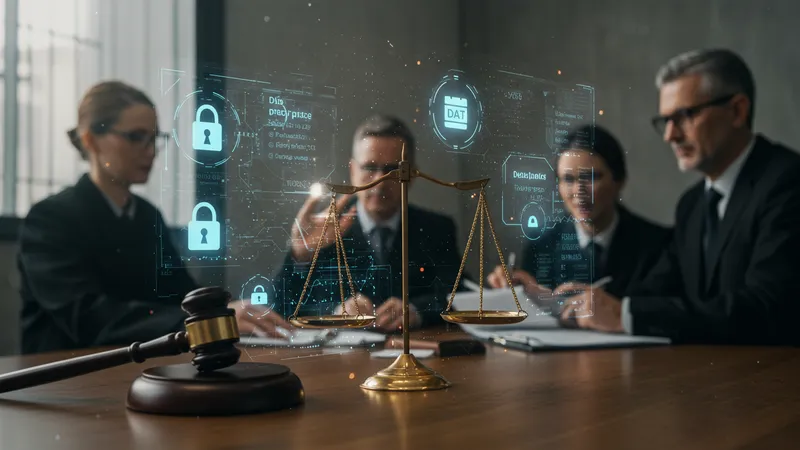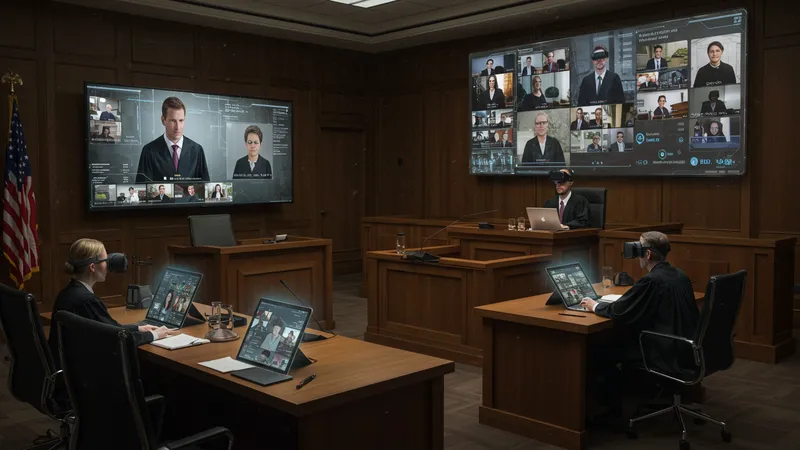

Did you know that some compensation law professionals are using AI to crack complex cases faster than ever? This emerging trend is reshaping the industry as we know it.
Compensation law has become critical in today's fast-paced world, where knowing your rights can mean the difference between justice and a missed opportunity. Stay curious to uncover what’s driving this change.

Everyone assumes compensation law is dry and uneventful. But recent shifts reveal it’s anything but! AI is not just speeding up case resolutions; it’s transforming the strategies lawyers use, opening a realm of possibilities never seen before. But that’s not even the wildest part…
Traditionally viewed as a monotonous field, the reality is that these professionals are at the forefront of legal innovation. From leveraging big data to employing virtual assistants, they're breaking old rules. It’s revolutionizing how they navigate complex legal landscapes. What happens next in this field shocked even the experts…
In a field traditionally dominated by human intuition and experience, the entry of AI has been nothing short of revolutionary. AI can sift through countless documents in seconds, providing lawyers with insights that might have taken weeks to uncover. These new-age tools are pushing lawyers to reconsider how they approach each case.

But there’s one more twist: rather than replacing the human touch, AI is actually enhancing it. Lawyers are using AI suggestions as a starting point for deeper investigation, allowing them to devote more time to crafting compelling arguments. This hybrid approach is the new frontier of legal warfare.
A recent study revealed that firms using AI have seen case resolution speeds increase by up to 40%. This means faster justice for clients and more efficient legal processes. For those in need of compensation, waiting in agony could soon be a thing of the past.
What you read next might change how you see this forever. Compensation law professionals are not just adapting but thriving in this tech-driven era, with future possibilities seeming as endless as they are exciting.

You might think that compensation law is solely about legal texts and courtrooms, but think again. Behind the scenes, a suite of innovative tools is empowering professionals like never before. Advanced software is providing detailed case analysis, giving lawyers a formidable edge.
One standout tool is case prediction software, which uses historical data to foresee potential outcomes. This isn’t just a game-changer for lawyers but also for clients, offering a glimpse into their future standing in legal battles. Clients can prepare better than they ever could without such insights.
Then there’s the impact of virtual reality in recreating accident scenes. By visualizing exactly what happened, lawyers can build more compelling cases. Clients experience a transformed narrative, one that vividly brings their story to life in front of juries and judges.
But with all these technological advances, there lies a tantalizing opportunity: the chance to redefine client-lawyer dynamics. Soon enough, compensation law might not just be about winning cases but creating immersive experiences that demand justice.

Top compensation lawyers aren’t just skilled in law; they’re masters of persuasion and innovation. Their secret isn’t just in their extensive knowledge but in their networking and resourcefulness. They tap into a vast network of experts to piece together unbeatable cases.
These legal pioneers lean on collaborations with tech experts, data analysts, and even forensic accountants, ensuring no stone is left unturned. It's this interdisciplinary approach that sets them apart in the courtroom.
Additionally, they are increasingly using blockchain for secure and immutable evidence handling. This adds a layer of trust and certainty to their cases, something deeply valued by clients and courts alike. With blockchain, evidence remains tamper-proof, which can be pivotal.
The next frontier for these lawyers is even more thrilling, blending tech innovations with old-school legal tenacity. Keep reading to discover how they aim to outmaneuver every challenge thrown their way.

Becoming a standout compensation lawyer doesn't just happen; it involves rigorous training that's evolving as rapidly as the technology they use. Modern training programs now integrate both traditional law coursework and cutting-edge tech training, preparing new graduates for a hybrid landscape.
This shift in education means that new lawyers are no longer just legal experts; they're also becoming tech-savvy professionals who understand both the intricacies of the law and the complicated algorithms that can support it.
Surprisingly, this tech-centric shift is leading to a rise in specialization. Younger lawyers are diving deep into niches like data privacy within compensation law, carving out unique career paths that didn’t exist before.
This era of specialization provides not only a fresh perspective but also paves the path for an exciting, dynamic career in compensation law. What follows could be the blueprint for all future legal professions.

While many focus on the cases themselves, there's an undercurrent of financial opportunity flowing through the world of compensation law. The integration of technology isn't just facilitating legal victories; it's opening doors to untapped revenue streams.
With tools that automate mundane tasks, firms are finding they can handle more clients with fewer resources. This boosts profits and creates the capacity to take on more complex cases. For the small to medium firms, it’s a potential gold mine.
On another front, compensation itself is evolving. Lawyers are exploring new compensation models, like success-based fees, making legal services more accessible to underrepresented clients. This shift towards inclusivity is not only socially responsible but financially prudent.
The next revelation about how compensation law firms are navigating this terrain could reshape your understanding of legal profitability and accessibility.

As exciting as AI developments can be, there are moments when technology doesn't meet expectations. Compensation law firms have faced occasional setbacks when AI predictions fall short of real-world results, highlighting the importance of human oversight.
These incidents serve as crucial learning points and remind us that while AI can be incredibly powerful, it’s far from infallible. Lawyers have had to adapt quickly, learning to discern when human intuition must override AI recommendations.
This delicate balance poses a continual challenge, yet it drives innovation. Firms are persistently refining their algorithms, aiming for that perfect synergy between human judgment and machine intelligence.
Curious about how compensation law firms are turning these roadblocks into opportunities for growth and innovation? The next step in this journey might just reveal a breakthrough.

The relationship between clients and lawyers is evolving as compensation law goes digital. Virtual consultations are becoming the norm, breaking down geographical barriers and increasing access for clients everywhere.
Advanced platforms are streamlining communication, ensuring that clients receive timely updates and transparency throughout their legal journey. This increased connectivity is bolstering trust and satisfaction like never before.
However, this shift isn’t without challenges. Lawyers must be adept at using these tools to maintain personal connections and ensure clients feel valued, even in a virtual environment.
Next, we’ll explore how embracing these changes could redefine the client experience forever. Could this transformation be the standard for all future legal practices?

Compensation law isn’t just about financial restitution; it's a powerful tool for social justice. Lawyers are finding themselves at the forefront of crucial societal issues, fighting for individuals who may otherwise go unheard.
From workplace discrimination to personal injury, these legal professionals are empowering those in need, using compensation law as a vehicle for change and equality.
The impact is monumental, with many cases setting precedents that ripple across society, prompting change not just in law but in corporate and public policies.
Curious to see how these lawyers are shaping a better world? The journey of how they balance these social responsibilities with their primary goal of winning cases is as inspiring as it is imperative.

There’s a common belief that solo practitioners in the legal field cannot compete with larger firms. However, with technological advancements, this notion is rapidly becoming out-of-date.
Solo compensation lawyers are now leveraging tech tools to take on cases with the same competence as large teams. This levels the playing field and allows them to offer personalized services that big firms may overlook.
Success stories abound of solo practitioners who have harnessed these tools to build thriving practices, proving that small doesn’t mean lesser in today’s legal landscape.
Discover how this trend is reshaping the competition and why solo practitioners might be leading the charge into a new era of compensation law.

As technology integrates into legal practices, ethical questions become more pressing. Issues around data privacy and AI decision-making are causing ripples in compensation law.
The debate centers on ensuring these powerful tools are used ethically and transparently, safeguarding clients’ rights while maximizing efficiency and outcomes.
Lawyers are tasked with navigating these murky waters, striking a balance between innovation and old-school ethical standards. It’s a rapidly evolving conversation, one that could define future regulations and practices.
Keep reading to learn about the initiatives shaping ethical guidelines and how they promise to safeguard both clients and lawyers in the digital-age courtroom.

Compensation lawyers are finding themselves at the crux of a legal revolution as technology disrupts traditional courtrooms. Virtual hearings are becoming commonplace, reducing logistical challenges and making justice more accessible.
This digital shift is democratizing access to legal proceedings, particularly benefiting those who might otherwise face significant hurdles reaching physical courtrooms. It marks a turning point in ensuring everyone has their day in court.
With the positive come challenges, and lawyers must adapt quickly to this new arena, learning to present cases with digital finesse while maintaining effectiveness and passion.
The next phase of this journey promises even more advancements that could render the thought of being physically present in a courtroom a relic of the past.

The trajectory of compensation claims is being reshaped thanks to unusual and unexpected alliances. Compensation lawyers are teaming up with data scientists, technologists, and even psychologists to bolster their cases.
These collaborations allow for a multi-faceted approach, integrating expertise beyond traditional legal boundaries to build robust, compelling cases that appeal to all facets of the judicial system.
It’s this collaborative approach that’s unlocking new potential in complex cases, broadening the scope of what compensation law can achieve. These alliances are redefining the limits of legal practice.
How will these collaborations continue to evolve, and what will this mean for future compensation claims? The answers lie in the next discovery.
The compensation law sector is on the brink of a significant transformation, and those who adapt quickly are set to thrive. By embracing technology and innovation, they're not just redefining their field; they’re setting benchmarks for all legal disciplines to follow.
As we move forward, sharing this insight is crucial. It's not just about legal professionals adapting; it's about ensuring that everyone has access to the justice they deserve in our ever-evolving world. Dive in, share, and be part of this groundbreaking change!